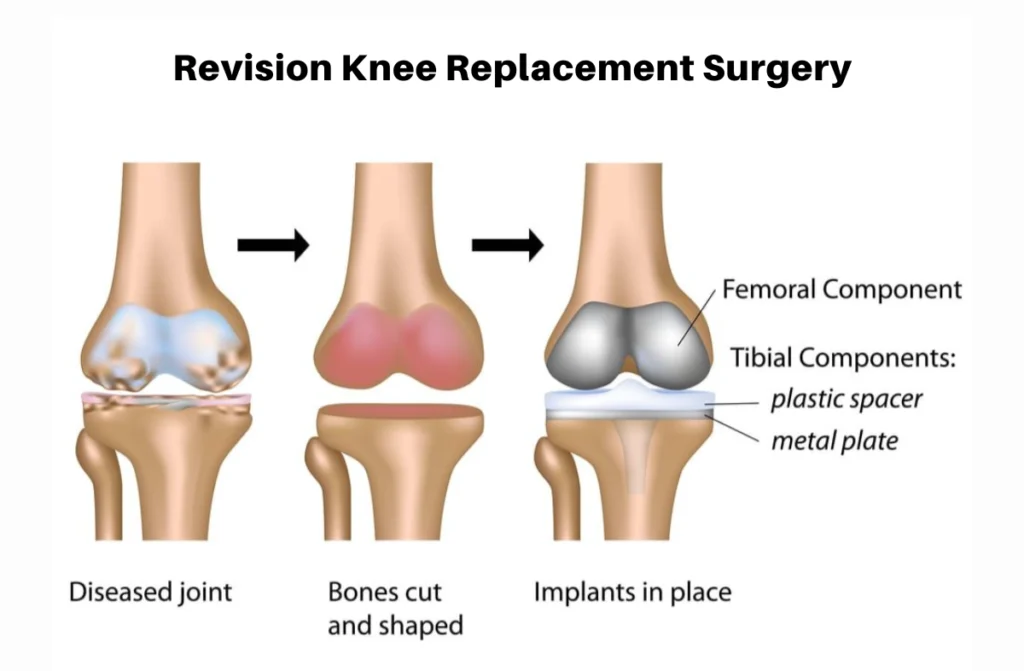Revision Knee Replacement Surgery is a procedure performed when a previous knee replacement fails or causes issues. This surgery involves removing the original prosthesis and replacing it with a new one. Sometimes, it may be required due to infection, wear and tear, or misalignment. This post will cover everything you need to know about Revision Knee Replacement Surgery, from the causes and symptoms to the recovery process. Whether you or a loved one is considering this procedure, understanding what to expect is important for a successful recovery.
What Is Knee Revision?
Revision Knee Replacement Surgery is essentially a “do-over” for a previous knee replacement. It involves removing the old implant, addressing any issues, and placing a new one. This surgery is more complex than the initial procedure because there’s already been damage to the surrounding bone and tissue.

Why Is Knee Revision Needed?
- Wear and Tear: Over time, knee implants can wear out.
- Infection: If the original knee replacement becomes infected, it may need to be removed.
- Instability: Some people experience looseness in their knees after surgery.
- Fracture: Broken bones around the knee implant may also require revision surgery.
Causes of Revision Knee Replacement Surgery
Several reasons can lead to needing Revision Knee Replacement Surgery. These include:
- Loosening of the implant: Over time, the original implant can become loose, leading to pain and instability.
- Infection: A knee infection can damage the joint and necessitate revision surgery.
- Wear and tear: While knee replacements are designed to last for years, they aren’t indestructible.
- Fractures: A broken bone near the knee implant can compromise the implant’s stability.
These issues can impact your daily life, leading to pain, reduced mobility, and swelling.
Risk of Revision Knee Replacement Surgery
Although Revision Knee Replacement Surgery can relieve pain and restore function, there are risks involved:
- Infection: This can be a significant concern.
- Blood clots: As with any surgery, blood clotting is a potential risk.
- Nerve injury: There’s a small risk of nerve damage during surgery.
- Prosthesis problems: The new knee implant may still wear out over time.
Being aware of these risks is essential when making decisions regarding surgery.
Signs and Symptoms That Indicate You Need Knee Revision
If you’ve had a previous knee replacement and are experiencing the following, Revision Knee Replacement Surgery may be needed:
- Increased pain in the knee joint
- Swelling or redness around the knee
- Looseness or instability in the knee
- Decreased range of motion
- Warmth in the joint area, indicating possible infection
It’s important to discuss any symptoms with your doctor so they can determine if revision surgery is necessary.
What Happens During a Knee Revision?
The process for Revision Knee Replacement Surgery is more complex than a primary knee replacement. Here’s what typically happens:
- The surgeon removes the old knee prosthesis.
- Any damaged bone or tissue is cleared away.
- A new knee implant is placed.
- In some cases, bone grafts may be used to rebuild areas of bone loss.
Revision Total Hip and Knee Arthroplasty
If the revision surgery involves both the knee and the hip, it’s called revision total hip and knee arthroplasty. The surgeon will carefully plan and balance the procedures to ensure the best outcome for both joints. This surgery requires even more care and precision to prevent future issues.
What Happens After the Surgery?
After Revision Knee Replacement Surgery, recovery is vital. You will need to stay in the best knee hospitals for a few days, where you’ll begin your rehabilitation journey. Here’s what you can expect immediately after surgery:
- Pain management: Medications will help control pain and discomfort.
- Physical therapy: You’ll start light exercises to regain motion in your knee.
- Mobility aids: Initially, you may need a walker or crutches to help with walking.
Following your doctor’s instructions closely will help prevent complications and speed up recovery.
What Is the Recovery Time?
The recovery from revision knee replacement time for Revision Knee Replacement Surgery is typically longer than for an initial knee replacement. Most people can expect to take several months to fully recover. Key factors that affect revision knee replacement recovery include:
- Physical therapy: Regular physical therapy will help regain strength and mobility.
- Health status: Pre-existing conditions may lengthen recovery time.
- Surgical complexity: The extent of the revision surgery can influence how long it takes to heal.
What Should I Expect After Surgery?
After recovery from revision knee replacement Surgery, it’s essential to follow your rehabilitation plan carefully. You can expect:
- Swelling: Swelling is common for several weeks post-surgery.
- Pain: Pain levels should decrease over time with proper medication and physical therapy.
- Mobility challenges: Walking with crutches or a walker may be necessary for the first few weeks.
Consistent follow-ups with your surgeon will ensure the healing process goes smoothly and any complications are addressed early.
Prevention Tips After Revision Knee Replacement Surgery
Proper care and precautions are essential after revision knee replacement surgery to prevent complications and promote recovery. Here are some helpful tips:
- Follow Your Doctor’s Instructions: Adhere to prescribed medications, wound care, and follow-up appointments.
- Engage in Physical Therapy: Regular physiotherapy helps strengthen the knee, improve mobility, and prevent stiffness.
- Use Assistive Devices: Walk with a cane or walker initially to avoid strain and reduce the risk of falls.
- Maintain a Healthy Weight: Excess weight puts stress on the knee joint, slowing recovery.
- Avoid High-Impact Activities: Steer clear of running, jumping, or heavy lifting to prevent joint damage.
- Practice Good Hygiene: Keep the surgical site clean and dry to avoid infections.
- Stay Active with Low-Impact Exercises: Gentle activities like swimming or cycling help maintain knee flexibility.
By following these tips, you can promote healing, prevent complications, and ensure a successful recovery.
Conclusion
In conclusion, Revision Knee Replacement Surgery can significantly improve your quality of life if you’re struggling with a failed knee replacement. While it is a more complex procedure than the initial surgery, the right care and expertise can lead to excellent results. If you’re experiencing symptoms or think you might need Revision Knee Replacement Surgery, contact CTS Hospitals for expert consultation.
Our specialists are well-versed in revision total hip and knee arthroplasty and can provide you with the best course of action for your condition. Reach out to us today for more details on revision knee replacement recovery and how we can help you get back on your feet.
